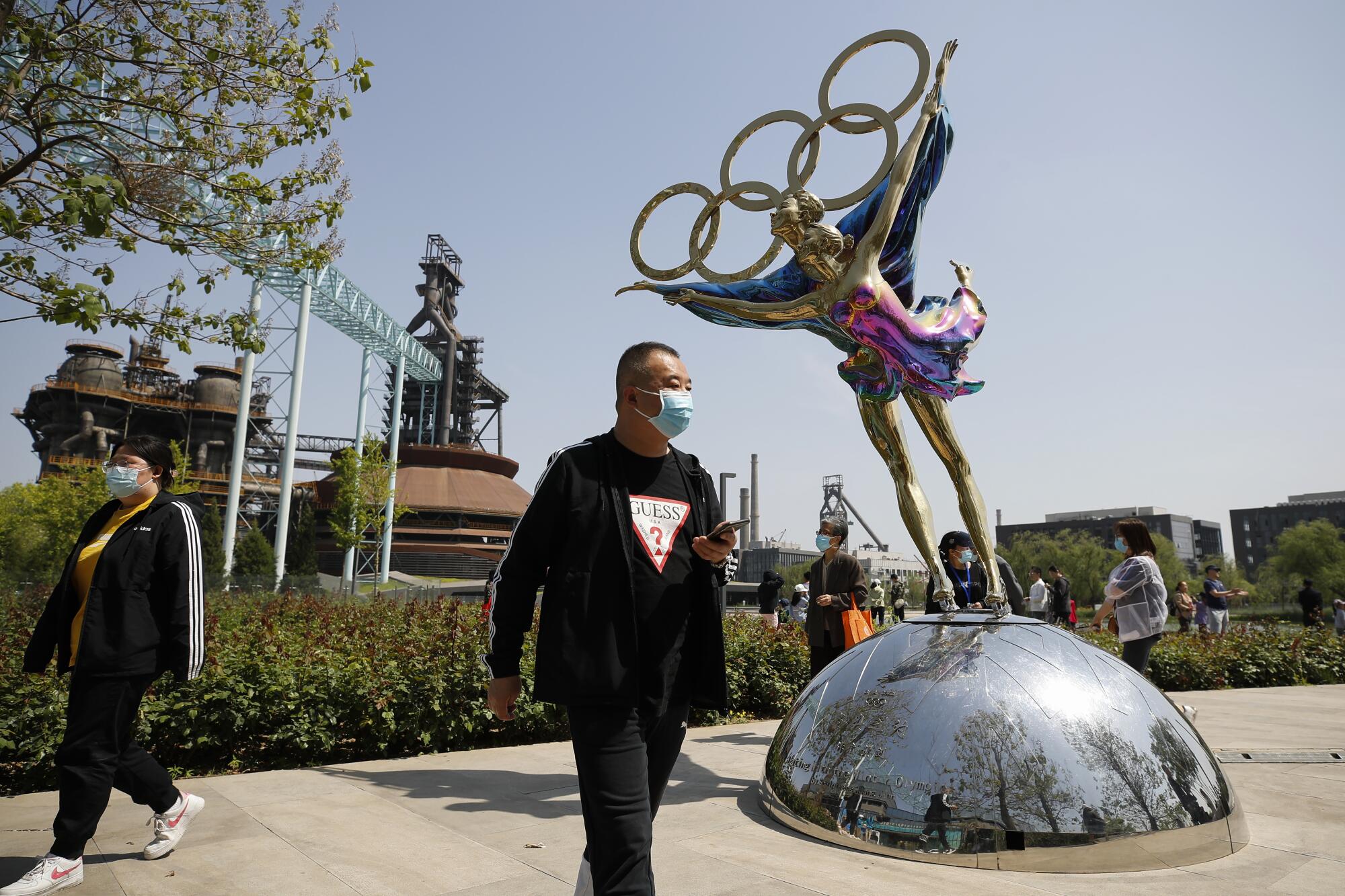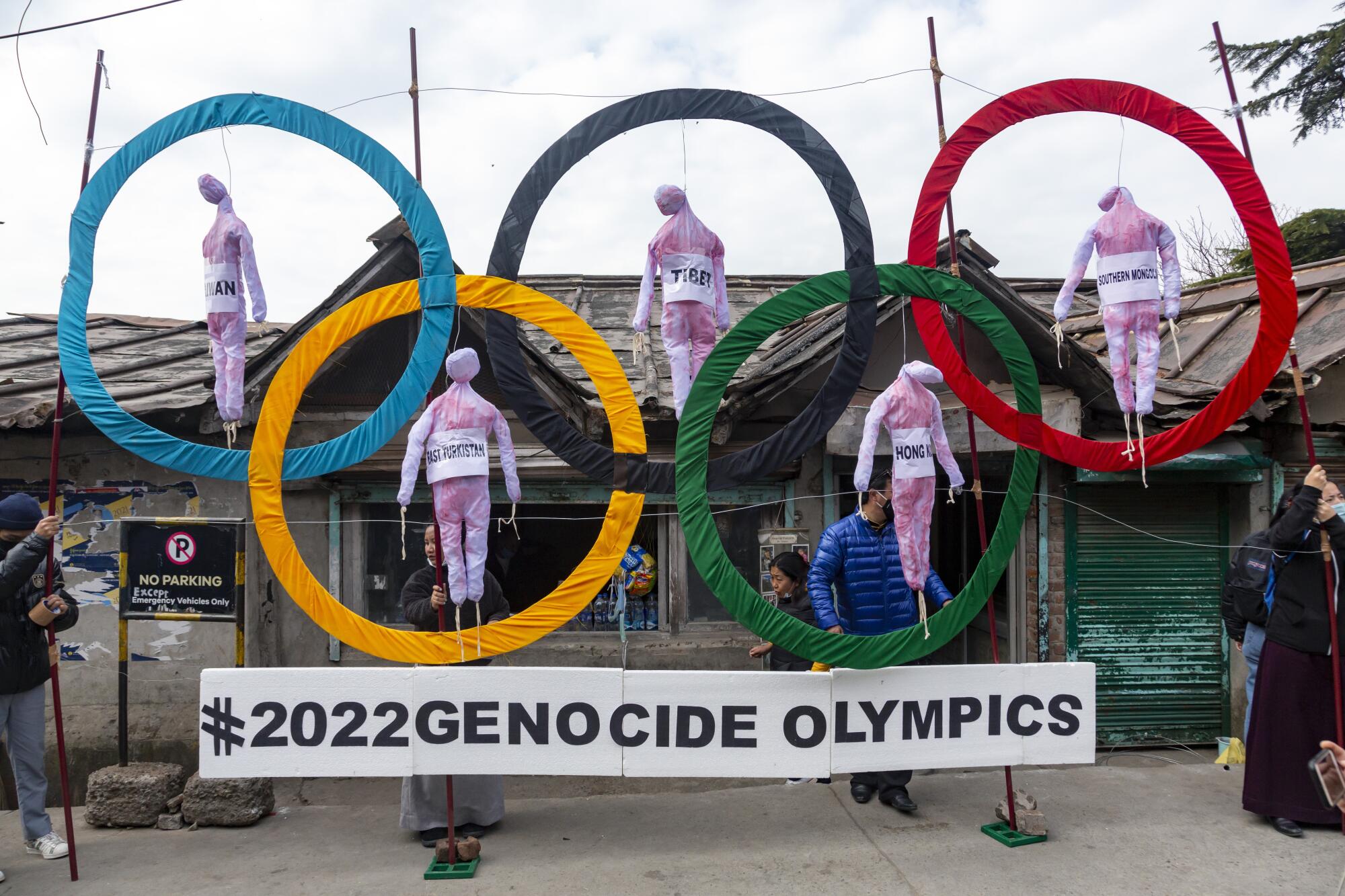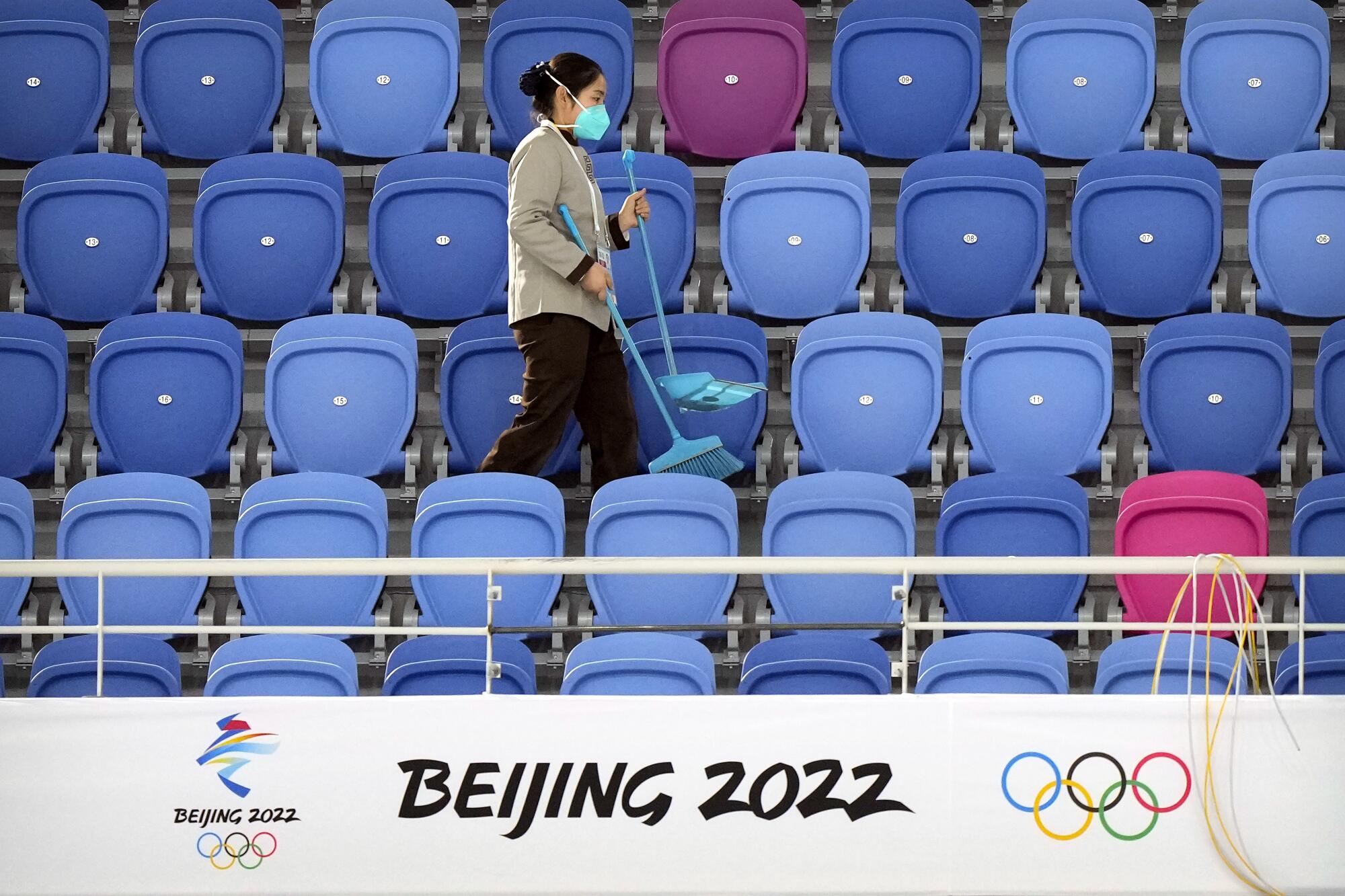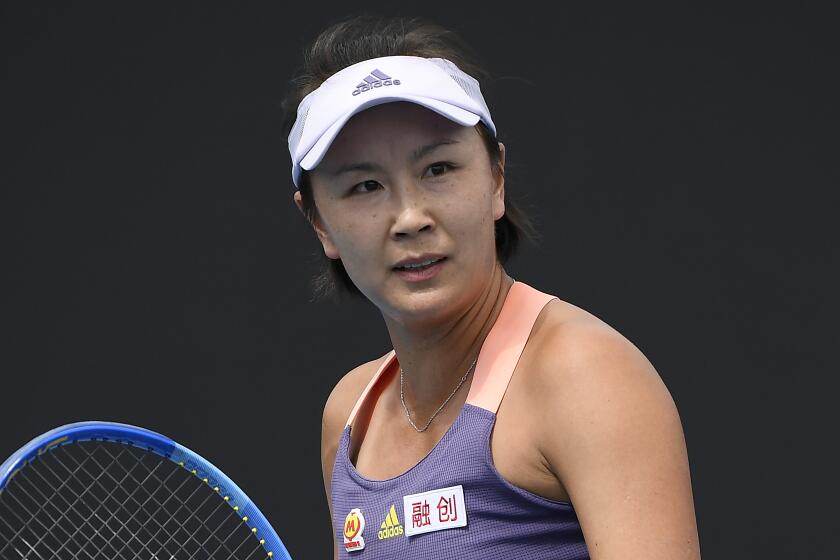
Beijing might have seemed like the best option at the time.
The International Olympic Committee needed somewhere to stage its 2022 Winter Games after several European capitals withdrew from bidding, scared away by the risk of hosting and paying for a multibillion-dollar sports event. The only remaining suitors were Beijing and the little-known city of Almaty in Kazakhstan.
When IOC members convened in July 2015 to cast their votes, the Chinese capital prevailed by a slim majority.
“This is really a safe choice,” IOC president Thomas Bach said, predicting the winner could reliably “deliver on its promises.”
Seven years later, as the Feb. 4 opening ceremony draws near, Bach and his colleagues still are paying the price for selecting a host country with a reputation for human rights abuses. Their standard line — sports and politics live in separate worlds — has failed to quiet global condemnation from activists, human rights organizations and some athletes.
Though threats of a multinational boycott have abated, the U.S. government has led a string of democratic countries in declaring a lesser “diplomatic boycott,” meaning they will protest by refusing to send representatives to the competition.
“We will not be contributing to the fanfare of the Games,” White House Press Secretary Jen Psaki said. Sen. Tom Cotton, an Arkansas Republican, went a step further in dubbing Beijing “the Genocide Games.”
::
The last thing these Olympics needed was another distraction.
In the wake of last summer’s Tokyo Games, the IOC faces yet another competition with strict COVID-19 restrictions and fears of an outbreak among athletes and coaches from around the world. But concerns about the spread of the Omicron variant have taken a backseat to political strife.
China has attracted criticism for its treatment of Uyghurs, Kazakhs and other ethnic minorities, with reports of indoctrination camps and cultural erasure leading to claims of genocide. Crackdowns on pro-democracy activists in Hong Kong and aggressive policies directed at Tibet, Mongolia and Taiwan have drawn further censure.
This month, Tibetan students protested by chaining themselves to the Olympic rings outside the IOC’s headquarters in Lausanne, Switzerland.

House Speaker Nancy Pelosi declared that allowing Beijing to serve as host city this winter “makes a mockery of the Olympic Charter, which states that the Games should seek to foster ‘respect for universal and ethical principles.’”
There is historical precedent for politics intruding on the Games. Three European nations withdrew from the 1956 Summer Olympics in response to the Soviet Union’s crushing of the Hungarian Revolution. In 1976, more than 20 African and Arab countries refused to participate in a protest related to South Africa’s apartheid policy.
More famously, the U.S. led a 65-nation boycott of the 1980 Moscow Games to protest the Soviet Union’s invasion of Afghanistan and the Soviets retaliated by skipping the 1984 Los Angeles Games.
The Biden administration settled on a less-severe diplomatic boycott because, Psaki said, “I don’t think that we felt it was the right step to penalize athletes who have been training and preparing for this moment.”
Britain, Canada and Australia followed suit.
The fallout has extended beyond geopolitics, with Human Rights Watch calling for corporate sponsors to address human rights violations; other groups have demanded that NBC not televise the Games.
The Olympics have become increasingly vulnerable to this type of controversy because of their cost. Oslo dropped out of the running for 2022 after its ruling parties declined to support a bid they deemed “so expensive.” Stockholm cited “too much speculation with taxpayers’ money” in making a similar decision.
As bids in democratic countries give way to political concerns and public referendums, authoritarian nations can step forward with promises to pay the hefty tab, no questions asked.

Beijing spent a reported $40 billion when it hosted the 2008 Summer Games. Russia topped that with an estimated $51 billion in 2014.
“The Olympic family has put its faith in Beijing again to deliver the athlete-centered, sustainable and economical Games we have promised,” the nation’s bid committee said in a statement.
::
It was early November when Chinese tennis star Peng Shuai accused a former Communist Party leader of pressuring her to have sex. As the scandal went viral, she vanished from public view.
Her disappearance raised fears, given the growing list of Chinese officials, celebrities and activists who have gone missing after criticizing party figures or speaking out against national policies. The timing was especially bad for IOC leaders.
Bach arranged a 30-minute video call with Peng, sharing only a still photograph of their meeting and a brief statement.
“She explained that she is safe and well, living at her home in Beijing, but would like to have her privacy respected at this time,” the statement read. “That is why she prefers to spend her time with friends and family right now.”
Things got even more muddled last week when Peng denied to a Singapore newspaper that she ever said she was sexually assaulted, calling it “a lot of misunderstandings.”
Tennis star Peng Shuai denies accusing a former top Chinese official of sexual assault, despite a November social media post attributed to her.
In the weeks since this started, Olympic leaders have continued to defend going to Beijing. Bach dismissed the diplomatic boycotts by saying “we have our full focus on the athletes … the rest is politics.”
China was predictably sharper in hitting back against the U.S. and others. With the 2028 Summer Games set for Los Angeles, party officials hinted at a replay of the American-Soviet tit-for-tat in the 1980s.
“The U.S. will pay a price for its practices,” said Zhao Lijian, a spokesman for the Chinese Foreign Ministry. “You may stay tuned for follow-ups.”
With less than two months to go before the opening ceremony, Antonio Guterres, secretary general of the United Nations, helped the IOC’s cause by accepting an invitation to the Games. France, which will host the 2024 Summer Olympics, has done likewise and many European Union countries are reportedly hesitant to decline for fear of hurting trade relations with China.
“I don’t think we should politicize these topics, especially if it’s to take steps that are insignificant and symbolic,” French President Emmanuel Macron said. “To be clear, you either have a complete boycott, and don’t send athletes, or you try to change things with useful actions.”
::
Facing repeated questions about competing in China — a familiar theme at news conferences this fall — U.S. Olympic & Paralympic Committee officials stuck to the IOC’s line of reasoning.
“We strongly believe that the governments of the world, including our own, and the respective diplomatic teams and experts, should lead the conversation about international relations,” USOPC chief executive Sarah Hirshland said. “We’re still trying to stay in our own lane.”
This balancing act has been trickier for athletes, some of whom have strong personal opinions.
“I can say human rights violations are abysmal,” ice dancer Evan Bates said. “We’re human beings too and when we read and hear about the things that are happening [in China] … we hate that.”

But, like others, Bates stopped short of calling for a full boycott. He would like to believe that staging the Olympics in Beijing might “shed light on this topic.” Luge racer Tucker West put it another way.
“It’s not my job to decide where the Olympics are,” West said. “So I’m going to show up to Beijing.”
For 17 days in February, China will have the opportunity to showcase its new arenas and ski resorts as well as a multibillion-dollar, high-speed railway line connecting the city to distant mountains. There will be scenes of joyous athletes and cheering crowds — only domestic spectators will be allowed — telecast worldwide.
Representatives from more than 70 of the 90 countries expected to participate in the Games recently attended a diplomatic briefing to hear about Olympic venues and schedules. Organizers spoke at length on coronavirus protocols designed to keep the competition safe.
IOC member Juan Antonio Samaranch, who served as a liaison between his organization and China, expressed confidence that the Games would be “extraordinary.” He did, however, acknowledge the last few years have been “a very long and complicated journey.”
More to Read
Go beyond the scoreboard
Get the latest on L.A.'s teams in the daily Sports Report newsletter.
You may occasionally receive promotional content from the Los Angeles Times.








